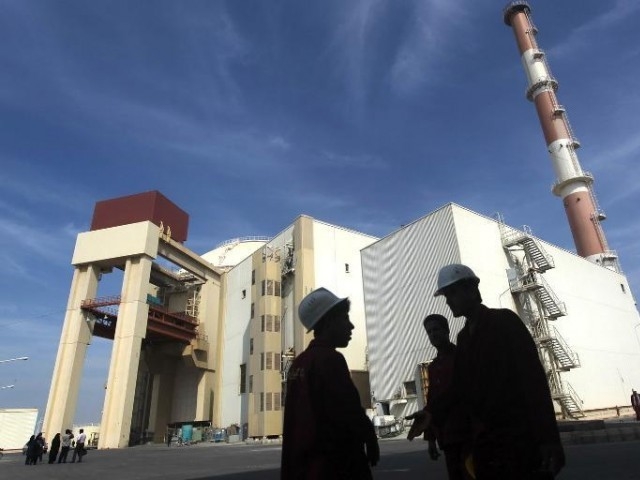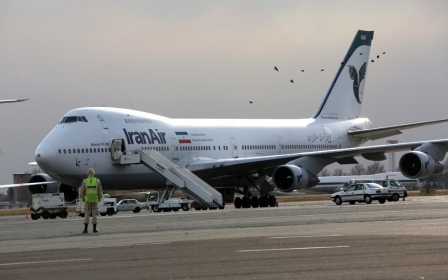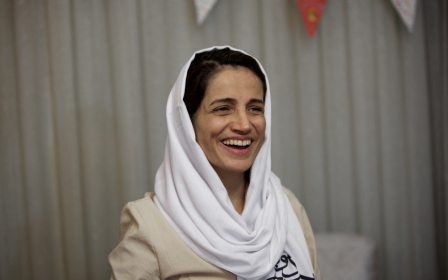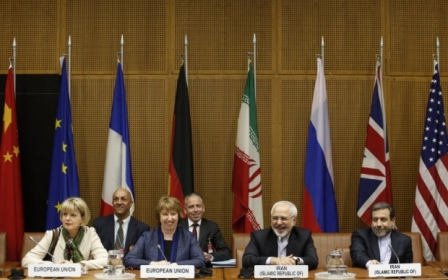Time to 'finish the job' in Iran nuclear talks, says top US negotiator

America's top negotiator who is leading talks to curb Tehran's nuclear ambitions, called on Iranian leaders on Thursday to "make the right choice," saying now was the time to reach a deal.
"If Iran truly wants to resolve its differences with the international community - and facilitate the lifting of economic sanctions - it will have no better chance than between now and November 24," Undersecretary of State Wendy Sherman said.
"This is the time to finish the job."
She also warned that if Iran and the six powers leading the talks, known as the P5+1(US, UK, France, Germany, Russia and China) fail to meet their November deadline for reaching a comprehensive deal, Iran will be held responsible.
The aim is to close all of Tehran's avenues towards developing nuclear weapons capabilities by cutting back its nuclear enrichment program, shutting down facilities considered suspect and imposing tough international inspections.
In return, the international community would suspend and then gradually lift the crippling economic sanctions imposed on the Islamic republic.
"Will that happen?" Sherman asked, addressing an audience at a two-day symposium held at the Centre for Strategic and International Studies think-tank in Washington.
"I don’t know. I can tell you that all the components of a plan that should be acceptable to both sides are on the table."
However, she gave no details about the complex draft accord being hammered out by teams of experts, which is complete with complicated pages of technical annexes.
"Our bottom line is unambiguous, crystal-clear, and written-in-stone: Iran will not, shall not obtain a nuclear weapon," Sherman pledged.
The P5+1 has, though, put forward a number of ideas recognising "Tehran’s expressed desire for a viable civilian nuclear program and that take into account that country’s scientific knowhow and economic needs."
Iran has consistently argued that its nuclear programme is entirely peaceful, insisting that it uses such technology to generate power for the huge country and calling economic sanctions unfair and illegal.
Progress on ‘intractable’ issues
In a bid to break the stalemate, which has seen several previous rounds of talks fail, US Secretary of State John Kerry and his Iranian counterpart Mohammad Javad Zarif held six hours of talks in a Vienna hotel last week.
"We have made impressive progress on issues that originally seemed intractable," Sherman insisted.
But she stressed the negotiations were "a puzzle with many interlocking pieces" and were "the very opposite of easy."
The talks remain at a "difficult stage”, according to Sherman.
So far the Americans have said they are not even talking about extending the deadline again, after an early July date for a final deal was missed.
Many observers believe, however, that a further extension will be unavoidable, as all sides have invested too much to simply walk away if they can't agree every detail in time.
Earlier this week, Iran offered “compromises” as the deadline approaches, offering to accept a gradual lifting of the restrictions rather than a total end to the sanctions programme.
However, Western officials dismissed the proposals, saying that Iran has always known that sanctions can only be lifted gradually.
US to raise Iran’s human rights record after nuclear deal
The US will continue to voice concerns about Iranian policies that undermine regional stability or that are inconsistent with “global norms and values”, regardless of whether a nuclear deal is reached, a US official said on Thursday.
Wendy Sherman delivered the official’s remarks at the Carnegie conference in Washington.
The official, she said, remained cautious about the nuclear talks – he did not want to jeopardise the talks, but said that the US “will continue to hold Iran’s government accountable for all aspects of its human rights record and for actions that exacerbate sectarian divisions,” he said.
He noted that he and his team have raised their concerns regarding the status of US citizens missing or detained in Iran.
“Nothing matters more to me as Under Secretary of State than ensuring the fair treatment of American citizens. Amir Hekmati, Saeed Abedini, Jason Rezaian should be allowed to return without delay to their families,” he said.
Hekmati is accused of being a spy. He was detained in August 2011 and held in solitary confinement for months. He was sentenced to death in January 2012 as the first American to receive the death penalty in Iran in more than 33 years.
Abedini, an Iranian American Christian pastor, has been detained since the summer of 2012. He was sentenced to eight years in prison on 27 January 2013, reportedly on charges of undermining Iran's national security.
Rezaian is a Washington Post correspondent in Tehran, and rumoured to be the producer of the Iranian version of the Pharrell Williams song “Happy” that went viral in May.
He and his wife Yeganeh Salehi, also a journalist, have been detained since July. Iranian authorities have not disclosed their whereabouts, welfare, or the reasons behind their detention.
Sherman also noted that Robert Levinson, an American citizen who went missing in Iran, should be found.
Levinson is an American private investigator and retired Drug Enforcement Agency and FBI agent. He went missing in Iran in March 2007 while visiting Iran's Kish Island, supposedly researching a cigarette smuggling case.
Iran moves to increase trade with the West
Despite uncertainty over whether the November deadline for a nuclear deal will be reached. Iran is “determined” to develop stronger economic ties with the Netherlands, according to the state news agency Fars.
The head of Iran’s Chamber of Commerce, Gholam Hussein Shafeyee, met Dutch officials in the Netherlands on Wednesday to discuss bilateral relations and mutual co-operation.
As the visit continued, with the Iranian delegation meeting officials from the public and private sessions in the Hague, a historic deal between Iran and Boeing was announced.
The US aerospace giant Boeing said on Wednesday that it had sold plane parts to Iran Air for the first time since the 1979 hostage crisis.
According to the company, the parts were purchased "consistent with guidance from the US government in connection with ongoing negotiations”, and more parts could be sold in the future.
Middle East Eye propose une couverture et une analyse indépendantes et incomparables du Moyen-Orient, de l’Afrique du Nord et d’autres régions du monde. Pour en savoir plus sur la reprise de ce contenu et les frais qui s’appliquent, veuillez remplir ce formulaire [en anglais]. Pour en savoir plus sur MEE, cliquez ici [en anglais].




